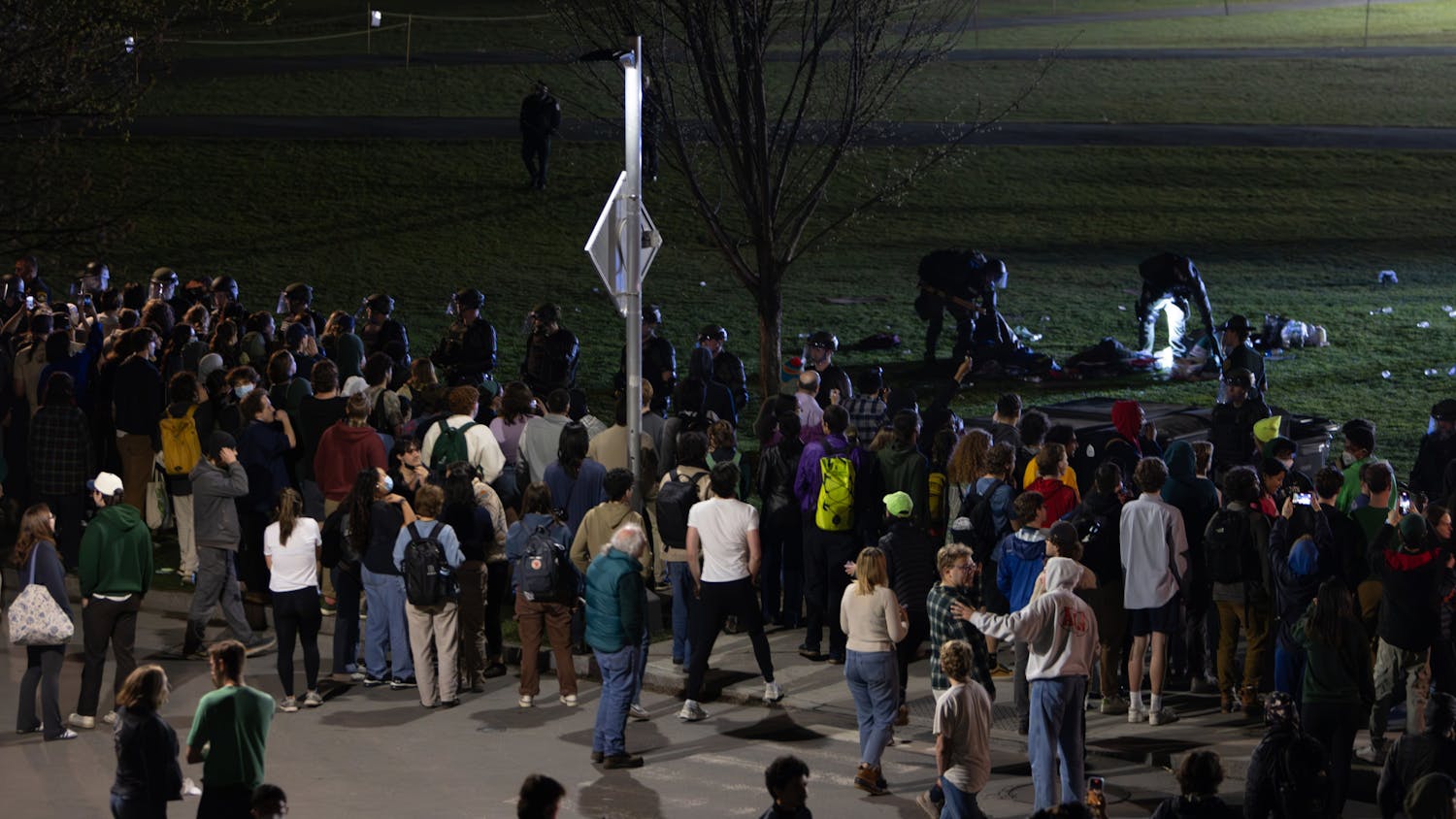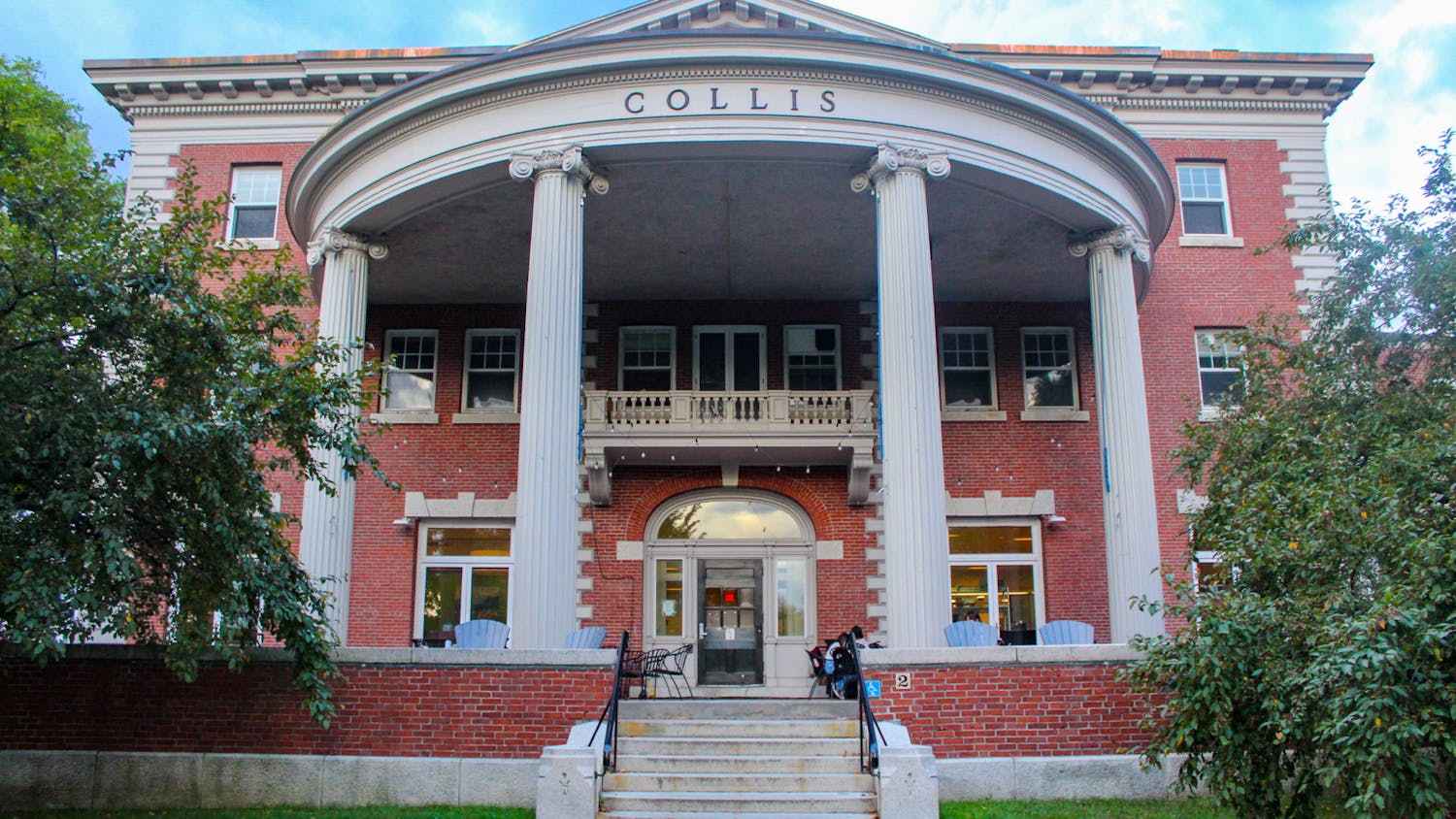The Class of 2013's final year was marked by a contentious campus climate and ongoing discussions of Dartmouth's image.
Last July, provost Carol Folt assumed the interim presidency after former President Jim Yong Kim left to head the World Bank. In the past year, Folt oversaw new alcohol and hazing policies, the search for a new president and conflict that prompted the cancellation of classes.
Campus Climate
At the Dimensions show for accepted students in April, about a dozen protesters from the Real Talk Dartmouth group pushed their way into the Class of 1953 Commons, chanting "Dartmouth has a problem" and shouting criticisms about the prevalence of sexual assault, racism and homophobia.
The protest caused a strong campus reaction. Several student protesters said they received violent, anonymous threats and the administration cancelled classes on April 24 in response. Classes were last canceled in 1986, when students destroyed shanties on the Green meant to protest apartheid in South Africa.
The day was filled with programs meant to foster community dialogue, including small discussion groups, a gathering on the Green and a free lunch in the Class of 1953 Commons.
The class cancellation was highly publicized on national media, including Fox News, CNN and USA Today.
Protesters maintained an active campus presence after the community discussion day, interrupting tour groups and protesting other campus events.
On May 23, Real Talk and others filed a Clery Act complaint against the College with testimonies from over 30 students and alumni claiming Clery violations of sexual assault, discrimination, hate crimes and hazing at the College.
Signed in 1990, the Clery Act requires universities to disclose information regarding campus crime. The federal government may impose fines or sanctions on institutions found in violation of the act.
Hanlon
Shortly after Folt assumed the interim presidency, the Board of Trustees launched a national presidential search committee chaired by Bill Helman '80. Students were off for winter break when the committee unanimously elected University of Michigan Provost Phil Hanlon '77 on Nov. 27.
Hanlon, who will assume office after Commencement, will be the first alumnus president since David McLaughlin '54 Tu'55. Hanlon graduated summa cum laude with a degree in mathematics and has spent his career in academia.
After receiving his PhD from the California Institute of Technology, Hanlon went on to teach applied mathematics at the Massachusetts Institute of Technology and CalTech before moving to Michigan in 1986. Hanlon was appointed provost in 2010.
Yield Numbers Fall
The number of both early and regular decision applications declined this year, as did the yield for regular admission. Dartmouth was the only Ivy League school to see an increase in its percentage of accepted students.
In December, 464 students were admitted through early decision, after applications declined by 12.5 percent. Some expressed concern over the school's highly publicized Greek scene, while others attributed the drop in applications to a preference for non-binding early action options at Yale University and Harvard University.
Regular decision applications declined by about 3 percent. The College received 22,400 applications and extended 2,252 offers, and 1,093 students indicated a commitment to enroll.
This totaled 48.5 percent yield rate, a 1 percent drop from the previous year. Dean of Admissions and Financial Aid Maria Laskaris said the yield was within her expectations.
Alcohol and Hazing Policies
New hazing and alcohol policies, crafted last summer by Dean of the College Charlotte Johnson, went into effect in mid-September.
The policies permitted Safety and Security officers to conduct random, unannounced walkthroughs of Greek houses, and undergraduate advisors are now required to report certain high risk behaviors.
The College also instated Brief Alcohol Screening and Intervention for College Students (BASICS), which requires students with alcohol violations to take a 20-minute survey on alcohol and drug use and meet with a BASICS provider.
In November, the College launched a bystander intervention program aimed at mitigating instances of sexual assault and hazing on campus. The initiative, created by clinical psychologist Jennifer Sayre '93, trains volunteers to intervene in situations they feel may be harmful. Sexual Assault Awareness Program coordinator Amanda Childress said that the office targeted its training to Greek life leaders, athletic team captains and other campus leaders.
A crackdown on hazing by the College accompanied additional student hazing allegations, which Dean of the College Charlotte Johnson attributed to students' increased comfort with reporting violations. Most notably, Alpha Phi Alpha fraternity was placed on three terms of College probation following a investigation into allegations of physical and mental hazing during the initiation process.
Year of the Arts
The College launched a year of special arts programming that included performances by cellist Yo-Yo Ma, trumpeter and composer Wynton Marsalis and actor John Lithgow.
The announcement coincided with the opening of the Black Family Visual Arts Center in September and the 50th anniversary of the Hopkins Center, which marked its anniversary in October with appearances by Rachel Dratch '88 and Aisha Tyler '92, among others.
The Hopkins Center is currently undergoing renovations to retrofit the classroom spaces previously used by visual artists.
The Hood Museum featured 100 works by Aboriginal Australian artists in "Crossing Cultures: The Owen and Wagner Collection of Contemporary Aboriginal Australian Art at the Hood Museum." The exhibit ran through early March.
Student Assembly elections
In April, students elected Adrian Ferrari '14 as student body president. Ferrari will succeed Suril Kantaria '13. Michael Zhu '14 was elected vice president by a margin of a six votes over Pallavi Kuppa-Apte '14, who ran on an unofficial ticket with Ferrari.
Ferrari ran on a platform of increasing communication and cooperation between campus groups, and said he wants to address incidents of bias with the Office of Pluralism and Leadership.
Student apathy characterized this year's election. Just 1,845 students cast ballots this year, compared to 2,239 last year, and attendance at the four debates preceding the elections was low. At a recent open meeting in which the Assembly outlined its plans for the next year, only three students were in attendance.
Rebranding Dartmouth
Following an onslaught of negative press about the College's Greek system, administrators have strived to rebrand the school, veering focus toward academics, research and extracurricular programs.
The College redesigned its website and is conducting a search for a new vice president of marketing. Admissions tour guide routes now skip Webster Avenue and highlight the Class of 1976 Life Sciences Center, which opened for classes in the fall of 2011. Dimensions weekend featured a stronger academic focus.
To increase Dartmouth's prestige around the world, a strategic planning report suggested changing the College's name to Dartmouth University for international audiences.
Presidential Election
Since New Hampshire is a crucial "swing state," Hanover bustled with campaign efforts in the fall before President Barack Obama's reelection.
Student organizations held well-attended debate watch parties and campaigned through phone calls and door-to-door stops in dorm buildings.
On the morning of Sept. 21, Vice President Joe Biden and his wife Jill Biden spoke at a grass roots event on the Cutter Shabazz lawn. In early November, Obama and former President Bill Clinton spoke at a campaign rally in Concord, which many students attended.



